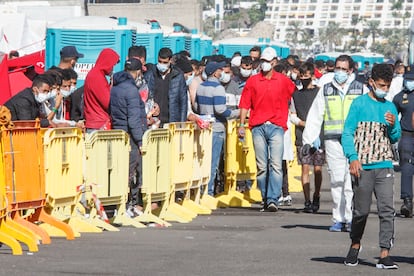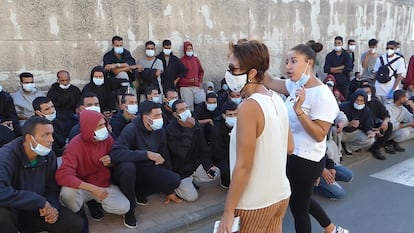Coordination failures led to early evacuation of 200 migrants in Spain’s Canary Islands
The immigrants are housed in hotels while authorities race to provide adequate public facilities amid a surge in arrivals

Two mistakes on Tuesday led police officers to remove 197 undocumented migrants from the port of Arguineguín, in Spain’s Canary Islands, before reception centers were ready to take them in, according to several government and police sources.
With nowhere to go, the migrants began wandering around the village until Onalia Bueno, the mayor of Mogán (which Arguineguín depends on administratively) had them transferred by bus to the city of Las Palmas, where they were dropped off in front of the building that houses the headquarters of the Spanish government delegation. They were later housed in tourist accommodation in the south of the island.
The Interior Ministry has opened an investigation and speeded up the inauguration of a temporary holding center inside military facilities in Barranco Seco, on the island of Gran Canaria. Around 200 migrants were sent there on Wednesday, and the Defense Ministry has provided resources to receive a further 200. Defense has also offered its facilities in Las Canteras (Tenerife), El Matorral (Fuerteventura), Las Raíces (Tenerife) and the premises of the Canarias 50 Regiment in the district of La Isleta in Las Palmas.
But on Wednesday there were still over 2,000 people living in precarious conditions in the Arguineguín port area. The Canary Islands have become the main point of illegal entry into Spain this year. According to Interior Ministry figures, 16,760 out of the 32,427 people who arrived by sea did so through the Canaries. Sea arrivals represent 95.5% of all migrant arrivals so far this year, reflecting border closures due to the coronavirus pandemic.
Lack of coordination
The government delegate in the Canaries, Anselmo Pestana, told the EFE news agency that neither he nor any member of his team authorized the early evacuation of the Arguineguín camp.
“There has evidently been a coordination mistake that we need to resolve,” he said. “The magnitude of the problem in the Canaries is huge. We are talking about growth of more than 1,100%, with arrivals in excess of 18,000 so far this year. We need to find a solution for the port, which everyone knows is overcrowded.”
The Tuesday incident adds to a growing humanitarian and political crisis in the Canary Islands, where around 8,000 migrants have arrived over the last month alone.
The surge in boat landings in the archipelago, which is located off the northwestern coast of Africa, has evidenced authorities’ inability to provide adequate facilities or assistance, and raised fears that the far right could use the crisis for political profit.
Local and regional leaders have been repeatedly complaining about a lack of support from the central government, and in some coastal towns under great migratory pressure, such as Arguineguín, residents have been staging public protests for months.
Double mistake

According to several government and police sources, the order to clear 200 people from the port was given verbally by a high-ranking police official to prevent what he assessed as “a risk situation.” Union sources talked about “a possible mutiny,” although Interior Ministry sources denied it.
Police officials said they made the decision after trying unsuccessfully to reach the State Secretary for Migrations by telephone to request assistance for the migrants about to be evacuated. Nobody answered the calls, and the police went ahead with the evacuation.
Sources at the Migration State Secretary’s Office said they were unaware of any calls, and noted that as soon as they received news of the evacuation, the migrants were housed in hotels and tourist apartments on the island.
The same sources said that the leaders of the police operation also failed to inform the Interior Ministry of their alleged problems contacting the Migration Secretary, or of their plans to go ahead anyway. Interior Minister Fernando Grande-Marlaska said that if the investigation shows a lack of coordination, he will have “no problem admitting it.”
There are currently around 4,000 migrants living in hotels and other types of tourist accommodation in the Canary Islands, according to the Migration State Secretary’s Office. This was made possible through cooperation by hotel entrepreneurs, who offered their empty premises to help alleviate the pressure in port areas. Earlier this month, however, industry leaders asked the government to provide adequate public facilities for the migrants and to transfer the latter out of the hotels as the region prepares for its peak tourist season.
With reporting by María Martín, Carlos E. Cué and José María Brunet.
English version by Susana Urra.
Tu suscripción se está usando en otro dispositivo
¿Quieres añadir otro usuario a tu suscripción?
Si continúas leyendo en este dispositivo, no se podrá leer en el otro.
FlechaTu suscripción se está usando en otro dispositivo y solo puedes acceder a EL PAÍS desde un dispositivo a la vez.
Si quieres compartir tu cuenta, cambia tu suscripción a la modalidad Premium, así podrás añadir otro usuario. Cada uno accederá con su propia cuenta de email, lo que os permitirá personalizar vuestra experiencia en EL PAÍS.
¿Tienes una suscripción de empresa? Accede aquí para contratar más cuentas.
En el caso de no saber quién está usando tu cuenta, te recomendamos cambiar tu contraseña aquí.
Si decides continuar compartiendo tu cuenta, este mensaje se mostrará en tu dispositivo y en el de la otra persona que está usando tu cuenta de forma indefinida, afectando a tu experiencia de lectura. Puedes consultar aquí los términos y condiciones de la suscripción digital.








































